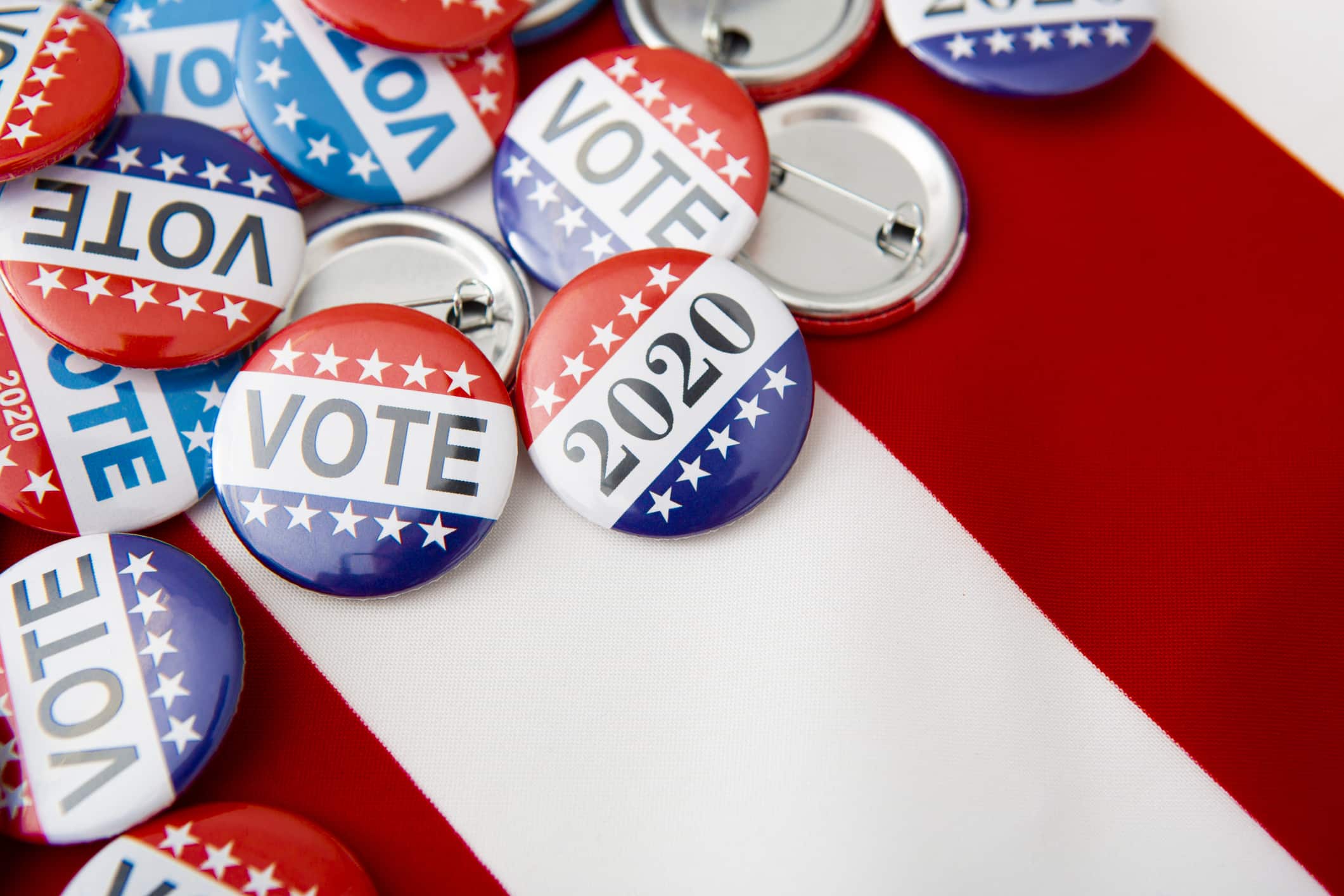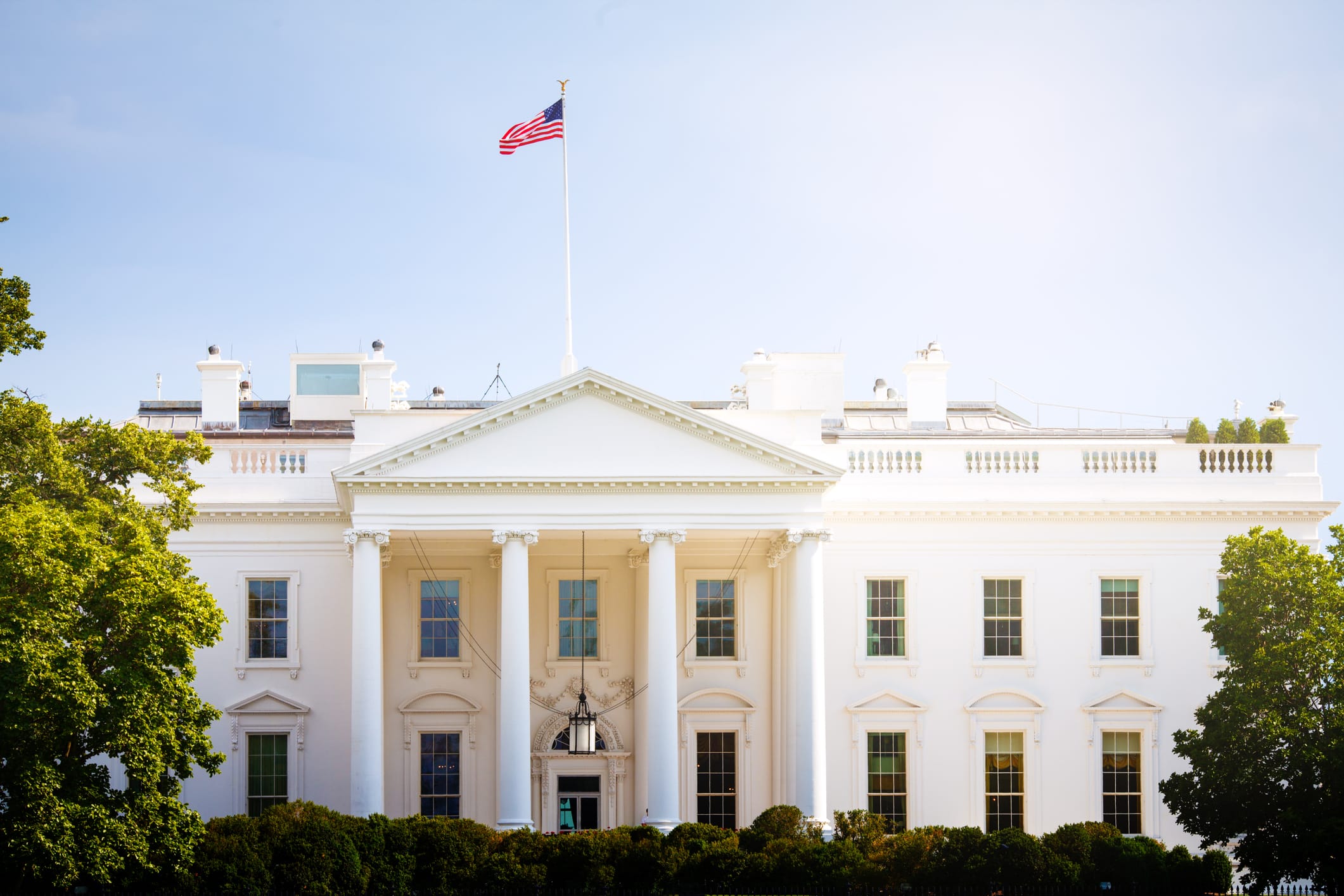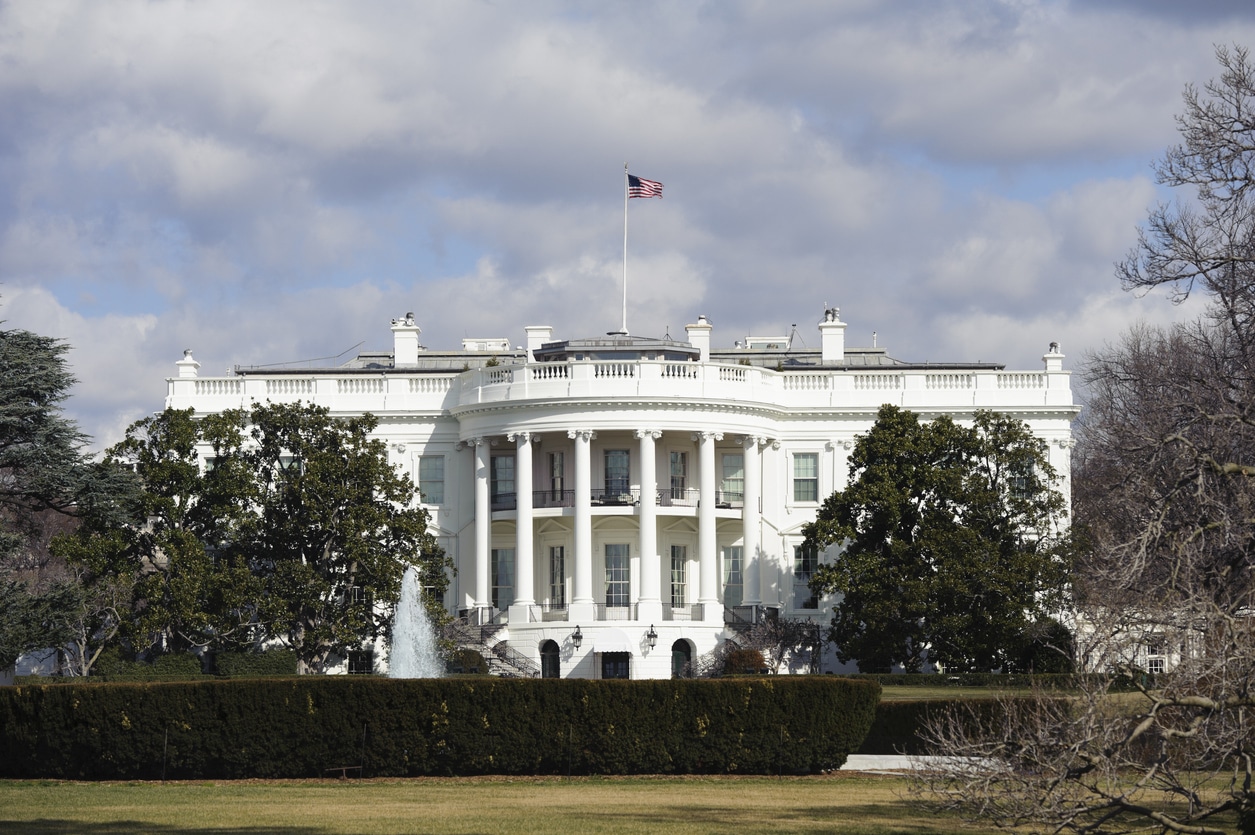A new Emerson College National Poll finds Vermont Senator Bernie Sanders taking the lead, now at 29% support. Falling to second is former VP Joe Biden at 22%, followed by former New York City Mayor Mike Bloomberg at 14%, Massachusetts Senator Elizabeth Warren at 12%, former South Bend Mayor Pete Buttigieg at 8%, Minnesota Senator Amy Klobuchar at 6%, Hawaii Representative Tulsi Gabbard at 4%, and Businessman Tom Steyer at 3%.

Spencer Kimball, Director of Emerson College Polling finds “Sanders continues to build upon his base and has solidified his position as the frontrunner. Biden has lost support, especially among African-Americans, which now opens the door for Bloomberg, maybe Buttigieg or even Klobuchar to win over the moderate voter and become the alternative to Sanders going into Super Tuesday.”
Since the previous national poll in January, Sanders, Buttigeg and Klobuchar gained two points, Biden has fallen eight points, Bloomberg moved up seven points, and Warren lost one point.
Sanders continues to draw his base of support from younger voters as he garners 39% support among voters under 50. Following him in that group is Biden at 16%, Warren at 15%, and Bloomberg at 9%. Among voters 50 and over, Biden leads with 31% support, followed by Bloomberg at 20%, Sanders at 15%, Klobuchar at 9%, and Buttigieg at 8%.
Among white voters, Sanders leads with 35% support, followed by Biden at 17%, Bloomberg at 11%, Warren and Buttigieg at 10% and Klobuchar at 9%. Among non-white voters, Biden leads with 28%, followed by Sanders with 22%, Bloomberg with 16%, and Warren with 12%. Buttigieg is at 6% and Klobuchar is at 2% among non-white voters.
Sanders has a commanding lead with “very liberal” voters at 58% support, followed by Warren at 20%, and no other candidate is in double digits with those voters. Sanders holds a smaller lead among “somewhat liberal” voters with 29% support, followed by Biden at 18%, Warren at 16%, and Bloomberg at 14%. And among “moderate” or “conservative” voters, Biden leads with 30%, followed by Sanders and Bloomberg at 17%, and Buttigieg at 9%.
Overall, 52% of Democratic primary voters said they will definitely vote for their preferred candidate, 48% said they could still change their minds. Sanders supporters are the most committed at 67%. Looking at the other top candidates, 60% of Biden supporters, 51% of Warren supporters, 49% of Bloomberg supporters, 45% of Klobuchar supporters and 26% of Buttigieg supporters are committed to their respective candidates.
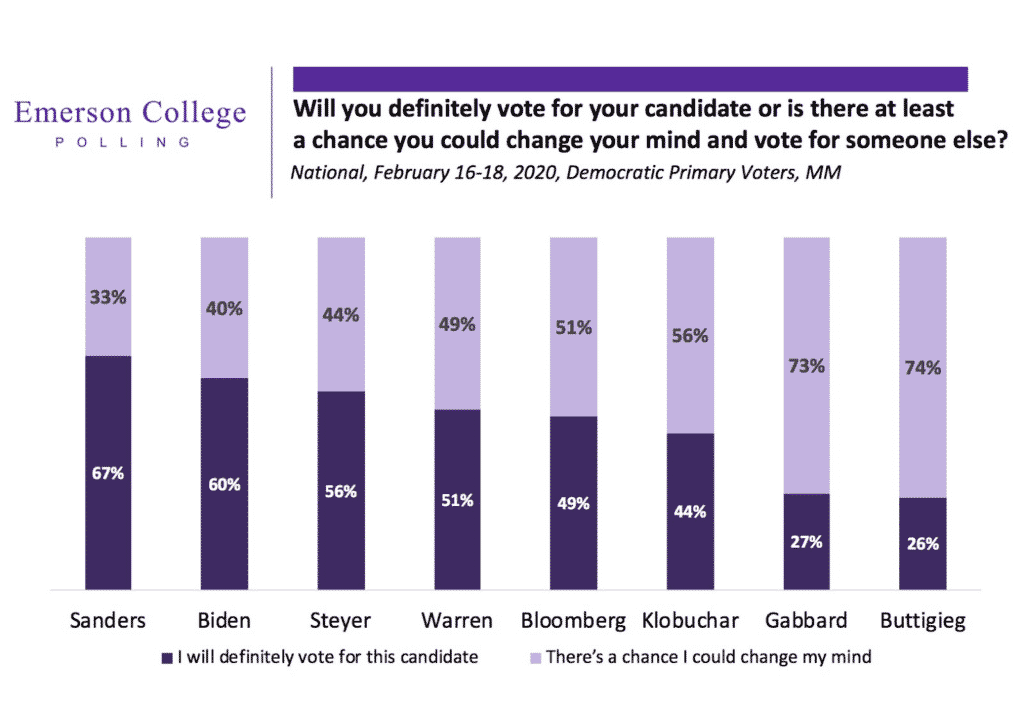
When asked whether they will support the Democratic nominee in the general election even if their preferred candidate does not get the nomination, 79% of Democratic primary voters said yes, 8% said no, and 13% said it depends on who the nominee is.
Respondents were also asked who they think will be the nominee, regardless of who they support. Sanders also lead in this question with 33%, followed by Biden with 22%, Bloomberg with 16%, Buttigieg with 8%, Klobuchar with 6% and Warren with 5%.
Democratic primary voters are split on which candidate would be the best to debate President Trump. Twenty-five percent (25%) said Sanders would be the best, followed by Biden at 23%, Bloomberg at 17% and Warren at 14%, the only candidates in double figures.
Democratic primary voters are also split on who they see as the best pick for Vice President with California Senator Kamala Harris as the top choice among 20% of Democratic primary voters, Entrepreneur Andrew Yang followed at 18% and Former Secretary of State Hillary Clinton was third at 16%. Stacey Abrams was picked by 8% of respondents, Former Rep. Beto O’Rourke got 6%, Ohio Senator Sherrod Brown received 5%, Andrew Gillum was chosen by 3% and Rep. Ilhan Omar was selected by 1% of respondents. A plurality of voters, 23%, said they would like to see someone other than the eight candidates listed in the question to be Vice President.

Among Sanders supporters, 31% said Yang would be the best pick for Vice President, 13% said Harris, 13% said Clinton; 23% said someone else. Among Biden supporters, 24% said Clinton would be the best pick for VP, 23% said Harris, 13% said Yang, and 14% said someone else. Among Bloomberg supporters, 22% picked Clinton, 19% picked Harris, 8% picked Yang and 35% said someone else. And among Warren supporters, 27% chose Harris, 14% chose Yang and Abrams, 9% chose Clinton and 17% chose someone else.
President Trump’s job performance rating of +4 points is the highest it has been since he took office. This month’s poll finds him at 48% approval and 44% disapproval, up from last month’s 47% approval and 48% disapproval. Emerson College Polling found Trump at 48% approval in December 2019, November 2019, and February 2017 as well but his disapproval numbers are lower now than they’ve ever been before. It also appears that there is no appetite within the GOP for a different nominee, as 91% said they would vote for Trump for the nomination in 2020.
In potential head-to-head match-ups, Trump leads 4 of his 5 democratic rivals, trailing only against Sanders 51% to 49%. The President leads Biden 52% to 48% and leads Bloomberg, Buttigieg, and Klobuchar 51% to 49%.

There is a significant gender divide in head to head matchups against the President; in all head to head matchups against the President, men break for Trump and women break for the Democratic nominee. Trump leads Biden 58%-42% among men whereas Biden leads 54%-46% among women. Against Sanders, Trump leads 55%-45% among men and Sanders leads 56%-45% among women. Against Klobuchar, Trump leads 57% to 43% among men and Klobuchar leads 55% to 45% among women. Against Bloomberg, Trump leads 58% to 42% among men whereas Bloomberg leads 55% to 45% among women. Against Buttigieg, Trump leads 57% to 43% among men and Buttigieg leads 55% to 45% among women.
Respondents were also asked whether they think there should be a single national primary day or if the current nominating system should stay the same. A majority, 60%, said that it should stay the same and 40% said there should be a national primary. There is a party divide on this question, as 48% of Democrats want a national primary compared to 28% of Republicans and 43% of Independents.
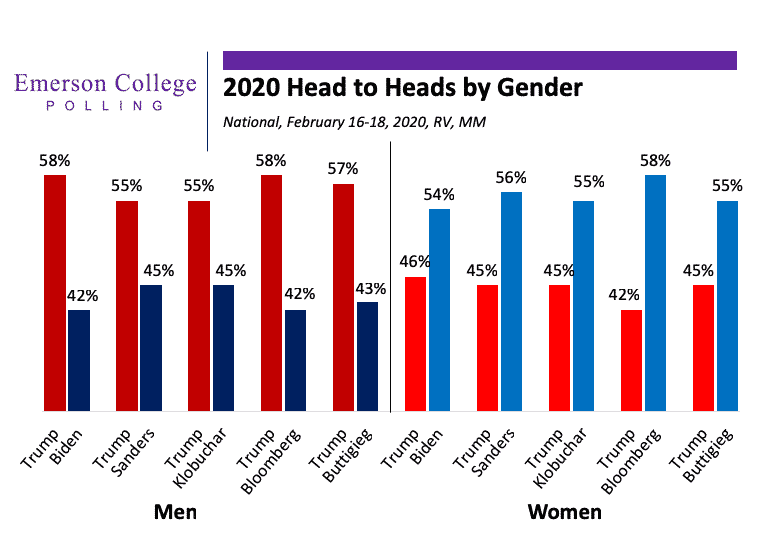
Overall, 42% of voters trust the current democratic nominating process while 37% are untrusting, 21% were unsure. Breakdown by party reveals that 49% of Democrats trust the current democratic nominating process, 29% find it untrustworthy, and 22% were unsure. For Republicans, 41% trust the current democratic nominating process, 44% find it untrustworthy, and 16% were unsure. And among Independents, 34% trust the current democratic nominating process, 40% find it untrustworthy, and 26% were unsure.
Voters seem to have moved on the issue of Billionaire Jeffrey Epstein’s death over the summer with 46% now saying he was murdered, 21% saying he committed suicide and 33% unsure. This is a significant shift from August 2019 when 34% believed he was murdered, 33% believed he committed suicide, and 32% were unsure. Looking within the top Democratic candidates’ supporters’, 55% of Sanders supporters think he was murdered compared to 40% of Bloomberg supporters, 33% of Biden supporters and 20% of Warren supporters. And among voters who supported President Trump in 2016, 56% believe that he was murdered.
A slight majority, 53%, said they would take a vaccine for Coronavirus if it existed while 19% said they would not and 28% were unsure. About a third of voters, 33% said the federal government should have the surgeon general announce a warning, put in travel restrictions, and create mandatory quarantines and vaccines. Nearly 26% said just a travel restriction would be enough, 17% said the Surgeon General Announcement/guidance would be appropriate. Twelve-percent (12%) would like mandatory quarantines while 6% would like mandatory vaccines. About 7% said none of these actions should be taken.
The most important issue for voters is the economy at 29%, followed by healthcare at 20%. Social issues came in third at 12%, the Environment was at 9% and Immigration rounded out the top 5 at 8%.
Caller ID
The National Emerson College poll was conducted February 16-18, 2020 under the supervision of Assistant Professor Spencer Kimball. The sample consisted of registered voters, n=1,250, with a Credibility Interval (CI) similar to a poll’s margin of error (MOE) of +/- 2.7 percentage points. The data was weighted based on 2016 voter model of gender, education, age, mode, party registration, ethnicity, and region. It is important to remember that subsets based on gender, age, party breakdown, ethnicity and region carry with them higher margins of error, as the sample size is reduced. Data was collected using both an Interactive Voice Response (IVR) system of landlines only (n= 772) and an online panel provided by Amazon Turk (n= 478).



